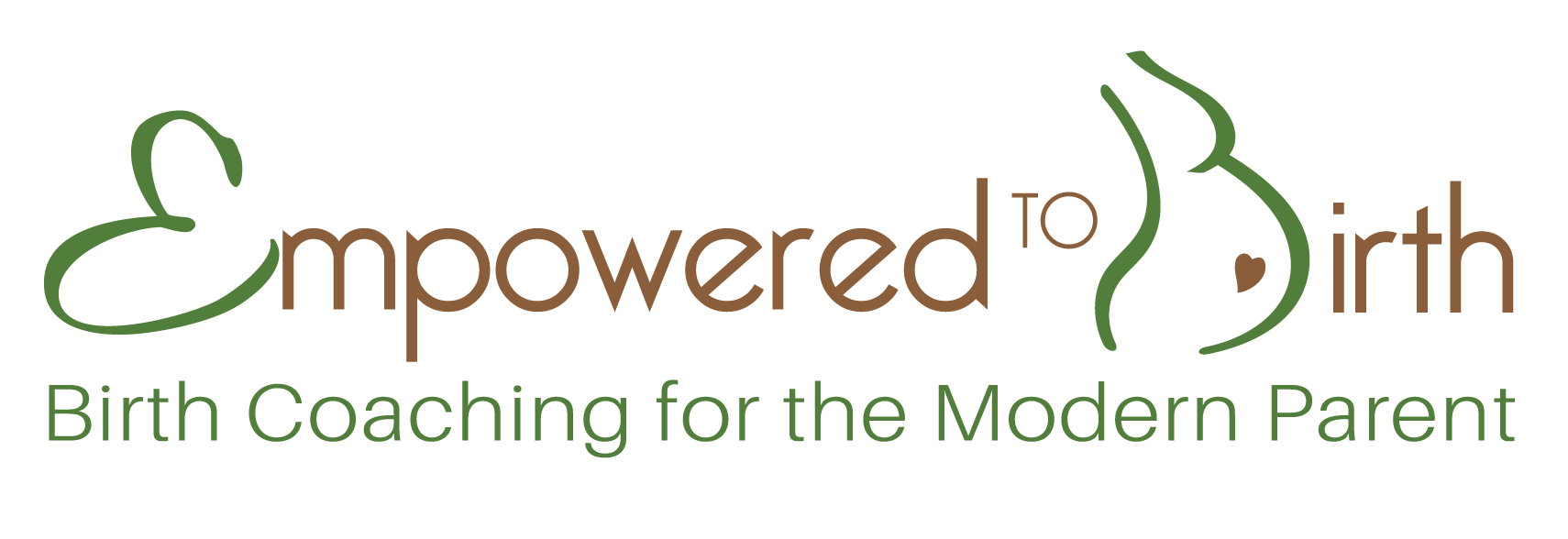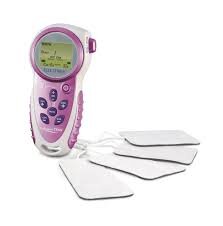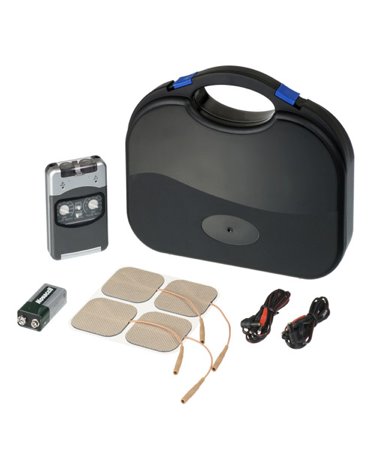What is a TENS device?
Transcutaneous Electrical Nerve Stimulation (TENS) is a small battery powered handheld device which sends a pulsed electrical stimulus via electrode pads to the skin. TENS has been professionally researched, tried and tested in Australian and European hospitals and clinics since the 1960's. TENS is commonly endorsed and used by Doctors, Midwives, Obstetricians, Physiotherapists, Nurses and Anaesthetist as a method of pain management in childbirth and chronic pain.
TENS is a non-drug (or non-pharmacological) way to help manage pain in labour.
The TENS unit consists of a handheld, portable device that is connected to four electrodes. There is a clip on the back of the unit, so it can be attached to your clothing for ease of use. The device is connected to the four electrodes using the two leads supplied (These are NOT disposable and deposit is void if they are not returned with the device). The electrodes are placed just under the bra line and just above the panty line. These electrodes are single person use, but can be removed and reused multiple times, provided they are carefully replaced on the plastic backing between uses. If the adhesive gel becomes dirty, if the skin is powdery, oily, wet or dirty, the number of times they are able to be re-applied will be reduced, due to losing their adhesive properties more quickly. Replacements, if required, can be purchased from Debra at the cost of $10 per set (x4).
Benefits:
Mother is in total control of using the device and can turn it up during contractions for added benefit
TENS is not a drug, therefore has no effect on the baby (after 37 weeks) and no effect on mother’s conscious state during labour
Can be used in conjunction with other coping strategies (except water immersion or massage)
Can be used in conjunction with Nitrous Oxide (gas) or Morphine (but not used with Epidural)
Helpful for the relief of back-ache in pregnancy and labour
Can be stopped at any time and has no residual effect
Disadvantages:
Does not take away all the sensations of labour
Needs to be started in early labour for most beneficial effect
Not compatible with being in water, so needs to be removed and replaced
Should NOT be used in the first trimester, as it is unknown if there are any effects on foetal development
Not to be used on the Abdomen in later stages of pregnancy and should be ceased immediately if unexpected uterine contractions occur
How does a labour TENS work?
The TENS machine works be emitting mild electrical pulses, which are sent through the skin and the body to the nerves and muscles, taking messages to the spinal cord and brain. When using TENS during labour, it might feel a buzzing, tingling, or prickling sensation wherever the pads are placed.
Researchers think that TENS might work by changing how a person perceives their pain. Or by distraction from the pain. Also decreasing anxiety about labour, as the TENS gives a woman some
level of control over labour.
There are two reasons TENS work in labour:
Used at Low-Intensity, Works on the “Gate Theory”,
where messages being sent to the brain from the TENS,
minimise the sensations felt from the body.
When started early in labour, or using higher intensity, help to stimulate the release of a woman’s’ natural Endorphins, these are her own pain relief hormones and more powerful than an injection of Morphine (depending on the literature you read, 10 to 40 times)
(The gate control theory of pain asserts that non-painful input closes the nerve "gates" to painful input, which prevents pain sensation from traveling to the central nervous system.) www.en.wikipedia.org
History and effectiveness of TENS:
The TENS machines have been used since the 1970’s for a variety of pain relief measures, such as for menstrual cramps, arthritis and several other chronic pain conditions. However, by the 1990’s, the TENS has become popular for use in Labour.
For example, in a 2009 survey of most birthing units and hospitals in England, they found that all 139 of those maternity care units supported and encouraged the use of TENS during labour. However, only about one in five of the maternity care units had their own TENS units that women could borrow during labour. The rest of them expected the consumer to come in with her own TENS unit to use.
Interestingly, the history of using TENS for pain relief may date as far back as the year A.D. 63, when the physician to the Roman emperor reported that he could relieve pain by standing on electrical fish at the seaside.
Contraindications to using TENS:
Occasionally interferes with CTG monitoring equipment
Check with your midwife, if this is an issue.
Not to be used:
When in Shower or Bath
While Epidural is insitu
During Back Massage
While Hot Packs in the same location
If you would like to Hire a TENS from Debra, please reserve yours early as they are popular. Suggested collection is around 36 weeks, so you have plenty of time to practice and become familiar with the operation of the device. TENS is also useful for backache in Pregnancy, so will be beneficial in the days and weeks leading up to labour.
Cost:
$80 for 6 week hire, Includes:
Collection from Junortoun on the date selected
Labour TENS with surge boost function
4 disposable electrodes compatible with the TENS supplied (to be disposed or kept after use - do NOT return with TENS)
the electrodes can be used 40 times, if they are kept sealed and replaced on their backing, they can be used for future births
spare batteries, if required
Reply Paid, Addressed Envelope for your convenience of prompt return after birthing your baby




